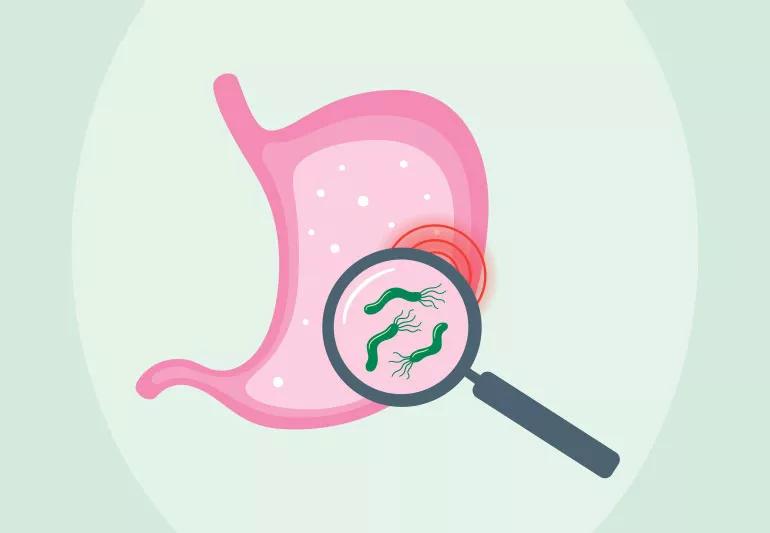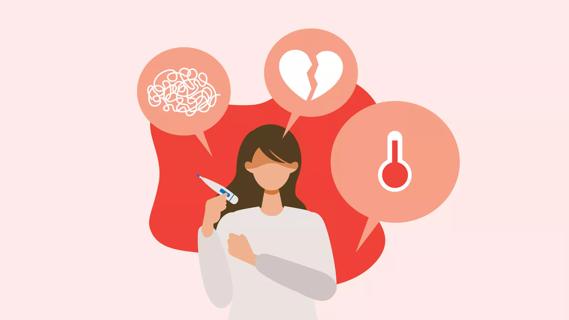There’s debate about whether there’s a relationship

Stress shoulders a lot of blame for health issues like high blood pressure, fatigue and depression — and rightly so. But when it comes to causing stomach ulcers, it gets a bit of a bad rap.
Advertisement
Cleveland Clinic is a non-profit academic medical center. Advertising on our site helps support our mission. We do not endorse non-Cleveland Clinic products or services. Policy
The main triggers for stomach ulcers, also known as peptic ulcers or gastric ulcers, are:
Now, that doesn’t mean stress is off the hook completely. While it might not be the main culprit behind stomach ulcers, it definitely qualifies as an accomplice. Gastroenterologist Christine Lee, MD, explains.
Research shows that there’s a relationship between stress and ulcers. But does stress actually cause ulcers? That’s where things get complicated.
From numerous studies, it’s pretty clear that stress often serves as a backdrop to stomach ulcers, explains Dr. Lee. People diagnosed with this stomach condition often report high levels of stress in their daily lives.
Your body’s natural response to stress also increases stomach acid, a source of ulcers.
But people under stress tend to use more NSAIDs to address aches and pains that develop. Stressors also can prompt more alcohol and tobacco use, factors known to fuel and worsen ulcer development, Dr. Lee notes.
Stress-stoking surgeries and illness have been connected to the development of stomach ulcers, too. (Plus, let’s be honest: The burning feeling in your gut that comes from an ulcer can amp up perceived stress levels!)
Advertisement
So, it becomes a question of which comes first, stress or the ulcer?
“Basically, it’s a chicken-or-the-egg sort of argument,” says Dr. Lee. “There’s a lot of conflicting research and debate on the topic. Most, though, view stress as something that does not cause stomach ulcers on its own.”
A lining in your stomach protects it against the caustic acids and enzymes inside of your gut. Ulcers develop when that lining breaks down and allows those internal juices to eat away at your stomach wall.
But what’s powerful enough to undermine that tough lining? Let’s look at the two main sources.
Between 50% and 75% of the world’s population has H. pylori bacteria in their belly. For most, it’s not a problem. Sometimes, though, this bacteria multiplies to the point where your immune system can’t keep it in check.
This bacteria overgrowth may eventually work around your stomach’s immune system and damage your stomach walls, leading to ulcers. About 40% of stomach ulcers are linked to H. pylori.
Taking an over-the-counter (OTC) pain pill is often shrugged off as no big deal in today’s world. But here’s the thing: The medications are powerful, and sending too many pills into your belly can cause problems.
The medication can irritate your stomach lining and even block your body’s natural ability to repair the damage. About 50% of stomach ulcers are caused by NSAID overuse.
The medication can decrease production of a hormone called prostaglandin, which can decrease the thickness of your stomach lining or impair your body’s natural ability to repair stomach lining damage.
Burning discomfort and indigestion are two classic signs of a stomach ulcer. It can be described as an intense sensation that sometimes accompanies gut pain. The discomfort typically grows when you have an empty stomach.
Other common symptoms include:
Common ulcers typically heal with medication designed to reduce stomach acid and put a protective coating over the ulcer. If an H. pylori infection is involved, antibiotics may be prescribed to kill the bacteria.
You’ll need to avoid irritating the ulcer, too, which means avoiding NSAIDs, alcohol and smoking during recovery. Limiting their use afterward could help you avoid future issues, as well.
While stress may not cause a stomach ulcer, it certainly doesn’t help it, says Dr. Lee. Learning how to better handle stressors in your life can help you be a healthier, happier and more productive person.
Advertisement
Ease stress by trying:
And if your life continually feels overwhelming, consider talking to your healthcare provider or a therapist.
Advertisement

Sign up for our Health Essentials emails for expert guidance on nutrition, fitness, sleep, skin care and more.
Learn more about our editorial process.
Advertisement

Even small moments of time outdoors can help reduce stress, boost mood and restore a sense of calm

Fill your coping toolbelt with healthy skills like getting outside, writing in a journal, volunteering, laughing or talking with a friend

We all experience some stress from time to time, but chronic stress can contribute to health issues like diabetes and cardiovascular disease

Getting outside, eating a healthy diet, taking up journaling, listening to music — even cuddling a pet — can provide stress relief

Give these 30+ grocery items a try to help find relief

In response to stress or danger, your brain responds by either defending itself, running away, stopping or reconciling

From nausea, weight gain and eczema, stress can affect your immune system in many ways

Stress hormones trigger cravings in an attempt to keep us safe from danger

Even small moments of time outdoors can help reduce stress, boost mood and restore a sense of calm

A correct prescription helps your eyes see clearly — but as natural changes occur, you may need stronger or different eyeglasses

Both are medical emergencies, but they are very distinct events with different causes